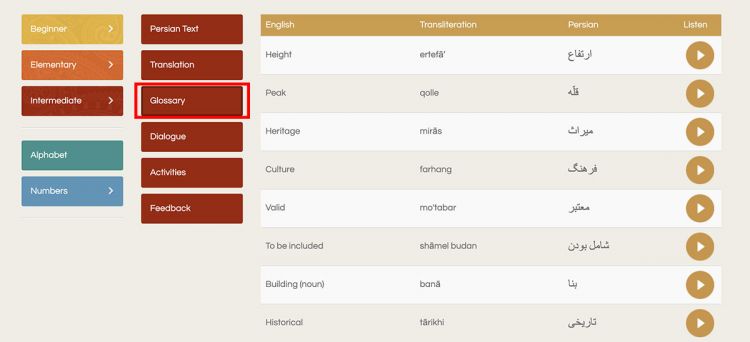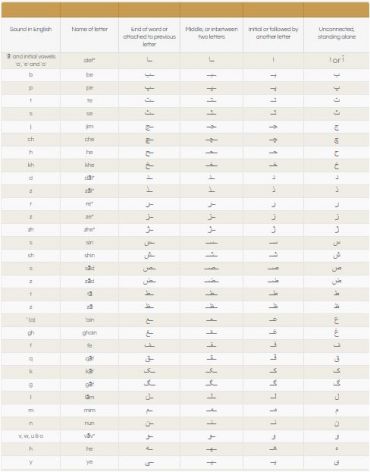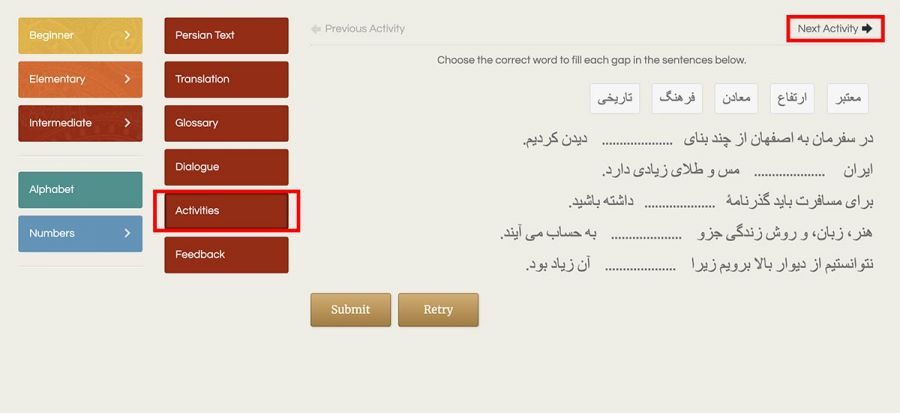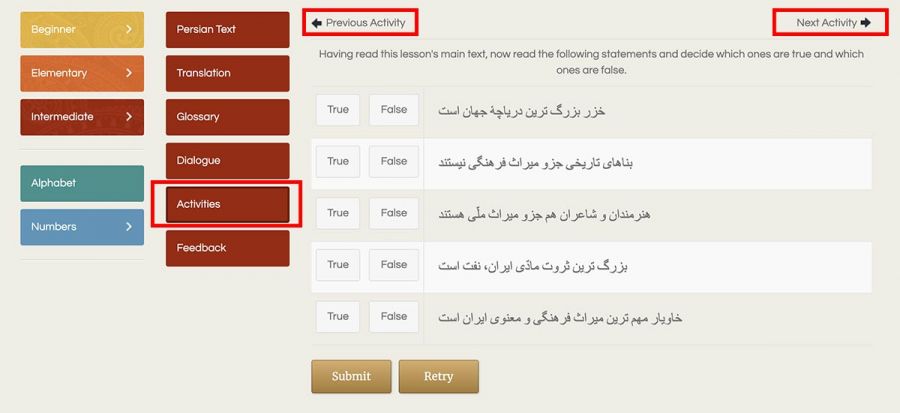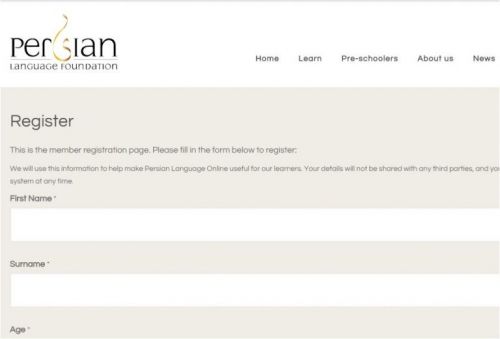
Project 6060 – Lesson 60
EN
FR
ES
FA
-
EN
Lesson 60
An Eye for an Eye
***
Translation
A play is one of the forms of literary writing and a text that has been written to be performed in a theatre is usually called a play. The format of a play is usually conversations between the show’s characters. In a play, the manner and appearance of the actors is also mentioned and information like the location and time of each event or each scene of the play is also given to the reader so that they can get a better picture of it in their own minds. Although plays have been common in Iran for many years, playwriting in its modern form does not have a long history in Iran. Perhaps it could be said that playwriting in Iran began with the Turkish plays of ‘Mirza Fathali Akhundzadeh’ and later, it could be said that the Persian plays of ‘Mirza Aqa Tabrizi’ and the translation of European plays into Persian, prepared the ground for its presence in Persian literature. One of Iran’s best playwrights was ‘Gholam Hossein Saedi’ who was born in Tabriz in the year 1936 and passed away in Paris at the age of fifty. Many of Saedi’s plays, film scripts, novels and collections of stories have survived Saedi.
One of his plays that has been performed several times is the play ‘An Eye for an Eye’, in which the tyranny of rulers is depicted. As you continue, you will read a section of this play.
(A large couch with a grand back, behind which is an unseen bed for resting on. When the curtain opens, nobody is on the stage. A few moments later, the sounds of a long yawn and, following that, the fat figure of the king, who has woken up slowly. He is sitting on the bed. A yawn again; he rubs his eyes and throws himself on the couch; he tests the accessories and objects that he has tied to himself; glances at his surroundings; thinks; a few moments pass in this way.)
King: I would like to know; did you wake me up?
Executioner: Me?
King: Yeah, you.
Executioner: Certainly not your honour; you woke me up.
King: So who woke me up?
Executioner: I have no idea your honour; your humble servant was asleep.
King: It has been a good few days now that in the late afternoon I have awoken like this for no reason. Why must it be like this? Why must our afternoon sleep be disturbed?
Executioner: Perhaps you are eating too much, your honour
King: Am I eating too much or are you? (He moves threateningly towards the executioner.)
Executioner: Well it’s obvious; of course it’s me, your humble servant..
King: So how come I’m not sleeping well?
Executioner: There are lots of possible reasons, your honour.
King: Such as?
Executioner: Such as… Such as maybe your conscience is disturbed.
King: What? My conscience might be disturbed? How could it be possible?
Executioner: It’s not possible, your honour, it’s just probable.
King: What’s probable?
Executioner: A disturbed conscience!
King: Due to what?
Executioner: There are lots of possible causes, your honour. But in the opinion of your humble servant, our work has been sluggish for a while and justice has not been served for three or four days.
King: Where did you get your information?
Executioner: Where does my information come from? Is not your humble servant the agent and enforcer of justice? At the end of the day, the account is in my hands, your honour.
King: You’re not mistaken?
Executioner:No way; no way, your honour. The last eye that we removed was three days ago.
King: So it’s because of this that I have been unable to sleep?
Executioner: It is one hundred percent because of this, your honour. But the cure for all of this is to take out an eye, your honour. Just one eye!
King: An eye for what?
Executioner: It would be in order to serve justice.
King: Now where are we going to take an eye from?
Executioner: They are a plentiful thing; eyes, your honour.
King: Yes, they are plentiful, but how long must we wait until somebody comes with a complaint.
Executioner: Leave it for your humble servant to find and identify and bring them.
King: So what are you waiting for? Instead of this verbosity, set off and get to work then.
Executioner: Sure, your honour. (Hurriedly he goes to leave the stage when he collides with a young man. The young man wails loudly and covers his face with his two hands.)
Executioner (shouting): Your honour, he came here on his own two feet.
(The executioner drags the young man into the middle of the stage. One eye had come out of its socket… The young man released himself from the grip of the executioner and threw himself at the feet of the ruler.)
Young Man: King, your excellence, I’m at your feet, I’m a wretch! Woe is me! Save me!
King: Get up, let me see, what do you want?
Young man: Retribution, retribution!
King: But what happened? Speak so I can see.
(The young man grasps the robes of the king and shows the empty eye socket.)
Young Man: My eye! My eye!
(He wails loudly.)
King: Your eye? What happened to your eye?
Young Man: It’s come out, your honour! It came out. Give me my retribution.
King: Hey; youngster! Tell me; who did this?
(Wailing, the young man brings out a thin iron rod to show).
Young Man: This did it, your honour; this did it!…
(The executioner and the king come closer and look at the rod. The executioner takes the rod from the young man.)
King: This did it?
Young Man: Yes, your honour…
(The king takes the rod. The executioner and the king both look, surprised, at the rod.)
King: So now what can we do with this?
Young Man: Get me my retribution! I’ve become a wretch. I’ve lost my life.
King: How can I get your retribution from this?
(The king turns to face the executioner.)
King: How is it possible to get retribution from this rod?
Executioner: From this rod, it’s not, your honour. But…
King: But what?
Executioner: But from its owner it is possible.
King: From its owner?
Executioner: Yes, your honour…
King (happy and grinning): Bravo! Clearly your head hasn’t stopped working yet!
Executioner: You’re welcome, your honour.
(The king thinks and looks very seriously at the executioner.)
King: Let me see; what if he, himself, is the owner of the rod?
(He points at the young man)
Executioner: If it’s him, himself?
(The executioner thinks.)
King: Yeah, what can be done then?
Executioner (Jollily): Much better! Much better! If that’s it, then our job is very easy!
King: How is it easy?
Executioner: That one eye that’s still healthy, your honour. Would you look at it? (He runs forward and points to the young man’s healthy eye.)
King: If that’s how it is, then what are you waiting for?…
(The executioner pulls out a dagger and grabs the young man’s hair. The young man hugs the king’s legs.)
Young Man: Your honour! Your honour! I’m not the owner of it!
King: You’re not? So who is it? Then answer me.
Young Man: An old woman, your honour!
King: Ok. Ok! So where is this old woman now?
Young Man: In her house, your honour.
King: And how did she remove your eye?
Young Man: In middle of last night I wanted to go and pay a visit to this old woman’s house and see if I could pinch something. I was just walking around in the dark and feeling the doors and walls when not only did I not find anything, but I also lost an eye. She had smacked a rod into the wall, which went in my eye. Then I ran out. I lost my eye.
Young Man (breathing heavily and emotionally): But I am sad about something else, your honour. I had wished I could lose this worthless eye for your majesty, king. One old beggar woman deprived me of this honour.
King (yelling): Old woman! Old woman!
-
FR
Leçon 60
Oeil pour oeil
***
Traduction
Coming soon
-
ES
Lección 60
Ojo por ojo
***
Traducción
Coming soon
-
FA
درس شصتم
چشم در برابر چشم
***
متن فارسی
نمایش نامه یکی از انواع نوشته های ادبی است و معمولاً به متنی گفته می شود که برای اجرا در تئاتر نوشته شده باشد. قالب نمایش نامه معمولاً گفت و گوی بین شخصیّت های نمایش است. در نمایش نامه حالات و ظاهر بازیگر نیز ذکر می شود و اطّلاعاتی مانند مکان و زمان هر حادثه یا هر صحنه از نمایش نیز به خواننده داده می شود تا تصویر بهتری از آن در ذهن خود مجسّم کند. هر چند هنر نمایش از سالیان بسیار دور در ایران رایج بوده است، امّا نمایش نامه نویسی به صورت مدرن و امروزی آن در ایران سابقۀ طولانی ندارد. شاید بتوان گفت نمایش نامه نویسی در ایران با نمایش نامه های ترکی «میرزا فتحعلی آخوندزاده» آغاز شد و بعدها با نمایش نامه های فارسی «میرزا آقا تبریزی» و ترجمۀ نمایش نامه های اروپایی به فارسی زمینه های حضور آن در ادبیات فارسی فراهم شد. یکی از بهترین نمایش نامه نویسان ایران «غلام حسین ساعدی» بود که در سال ۱۹۳۶ در تبریز به دنیا آمد و در سن پنجاه سالگی در پاریس درگذشت. از «ساعدی» نمایش نامه ها، فیلم نامه ها، رمان ها و مجموعه داستان های بسیاری به جا مانده است.
یکی از نمایش نامه های او که چندین بار به اجرا درآمده است نمایش نامۀ «چشم در برابر چشم» است که در آن ظلم حاکمان را به تصویر می کشد. در ادامه بخشی از این نمایش نامه را می خوانید.
(یک نیمكت بزرگ با پشتی مجلّل، و آن طرف پشتی تختی است ناپیدا، برای استراحت. پرده كه باز میشود، صحنه خالی است. چند لحظۀ بعد صدای یک دهن درّۀ بلند، و به دنبال آن هیکل چاق حاكم كه آرام بلند شده، روی تخت می نشیند. دوباره یک دهن درّه، چشمان پف كردهاش را میمالد و خود را روی نیمكت میاندازد، لوازم و اشیایی را كه به خود بند كرده، امتحان میكند، اطرافش را نگاه میكند، به فكر میرود، چند لحظه این چنین میگذرد. … )
حاكم: میخواستم بدونم تو منُ بیدار كردی؟
جلّاد: من؟
حاكم: آره تو.
جلّاد: نه خیر قربون، شما منُ بیدار كردین.
حاكم: پس منُ كی بیدار كرد؟
جلّاد: بیخبرم قربان، بنده خواب بودم.
حاكم: حالا چندین و چند روزه كه عصرها همین جور بیخودی از خواب بیدار می شم. چرا باید این جوری باشه؟ چرا باید خواب بعد از ظهر ما به هم بخوره؟
جلّاد: شاید زیاد می خورین قربان.
حاكم: من زیاد میخورم یا تو؟ (تهدیدآمیز به طرف جلّاد می رود.)
جلّاد: خب معلومه قربان، البته كه بنده.
حاكم: پس چطور شده كه من بدخواب شدم؟
جلّاد: خیلی علّتها ممكنه داشته باشه قربان.
حاكم: مثلاً؟
جلّاد: مثلاً… مثلاً ممكنه وجدانتون ناراحت باشه.
حاكم: چی؟ وجدان من ناراحت باشه؟ چطور ممكنه؟
جلّاد: ممكن كه نیس قربان، فقط احتمال داره.
حاكم: احتمال چی داره؟
جلّاد: ناراحتی وجدان!
حاكم: به چه علّت؟
جلّاد: علل زیادی ممكنه داشته باشه قربان. ولی اون كه به نظر بنده میرسه چنین است كه مدّتی است كار و بارمون كساده، و سه چهار روزه كه یه دونه هم عدالت اجرا نشده.
حاكم: تو از كجا خبر داری؟
جلّاد: از كجا خبر دارم؟ مگه بنده عامل و مجری عدالت نیستم؟ بالاخره حساب دستمه قربان.
حاكم: اشتباه نمیكنی؟
جلّاد: ابداً، ابداً قربان. آخرین چشمی كه درآوردیم سه روز پیش بوده.
حاكم: پس به این علّته كه خوابم نبرده؟
جلّاد: صد در صد به همین علّته قربان. امّا علاج همه اینها، در آوردن یه چشمه قربان. یه دونه چشم!
حاكم: چشم برای چی؟
جلّاد: برای این كه عدالت اجرا بشه.
حاكم: حالا ما چشم از كجا بیاریم؟
جلّاد: چیزی که فراوونه، چشمه قربان.
حاكم: بله، فراوونه، ولی چقدر باید منتظر بشیم تا یكی بیاد دادخواهی؟
جلّاد: پیدا كردن و شناختن و آوردنش با بنده.
حاكم: پس منتظر چی هستی؟ عوض ورّاجی راه بیفت و دست به كار شو دیگه.
جلّاد: چشم قربان. (با عجله میخواهد از صحنه بیرون برود كه به مرد جوانی برمیخورد. مرد جوان نالههای بلند میكند و با دو دست صورتش را پوشانده است.)
جلّاد (با فریاد): قربان، با پای خودش اومد.
(جلّاد مرد جوان را كشان كشان به وسط صحنه میآورد. یكی از چشمها از چشم خانه در آمده… مرد جوان خود را از دست جلّاد رها كرده، به پای حاكم میاندازد.)
مرد جوان: حضرت حاكم دستم به دامنت، بیچاره شدم! بدبخت شدم! نجاتم بده!
حاكم: پاشو ببینم، چی میخوای؟
مرد جوان: قصاص، قصاص!
حاكم: چی شده آخه؟ حرف بزن ببینم.
(مرد جوان دامن حاكم را میگیرد و چشمخانۀ خالی را نشان میدهد.)مرد جوان: چشمم، چشمم!
(نالههای بلند میكند.)
حاكم: چشمت؟ چشمت چی شده؟
مرد جوان: دراومده قربان! در اومده. قصاص منُ بگیرین.
حاكم: هی جوون! بگو ببینم كی این كارُ كرده؟(مرد جوان در حال ناله، میلۀ آهنی باریكی را درآورده نشان میدهد.)
مرد جوان: این كرده قربان، این كرده! … (جلّاد و حاكم نزدیك شده میله را تماشا میكنند. جلّاد میله را از مرد جوان میگیرد.) حاکم: این كرده؟ مرد جوان: بله قربان … (حاكم میله را میگیرد. جلّاد و حاكم هر دو با تعجّب به میله نگاه میكنند.)
حاكم: حالا ما با این چه كار میتونیم بكنیم؟
مرد جوان: قصاص منُ بگیرین! من دیگه بیچاره شدم. زندگیم از دست رفت.
حاكم: من چه جوری میتونم قصاص تو رُ از این بگیرم؟
(حاکم رو به جلّاد میكند.)
حاكم: چه جوری می شه از این میله قصاص گرفت؟
جلّاد: از این میله كه نمی شه قربان. امّا…
حاكم: امّا چی؟
جلّاد: امّا از صاحبش می شه.
حاكم: از صاحبش؟
جلّاد: بله قربان ….
حاكم (خوشحال و خنده رو): بارك الله! معلومه كه هنوز كلّه ات از كار نیفتاده!
جلّاد: اختیار دارین قربان.(حاكم به فكر میرود و خیلی جدّی رو به جلّاد.)
حاكم: ببینم، اگر صاحب میله خودش باشه چی؟
(مرد جوان را نشان می دهد.)
جلّاد: خودش باشه؟
(جلّاد فكر می كند.)
حاكم: آره، اون وقت چه كار می شه كرد؟
جلّاد (با خوشحالی): چه بهتر! چه بهتر! اگر چنین باشه كارمون خیلی راحته.
حاكم: چه جوری راحته؟
جلّاد: اون یكی چشمش كه هنوز سالمه قربان. ملاحظه میفرمایین؟ (جلو دویده چشم سالم مرد جوان را نشان میدهد.)
حاكم: حالا كه این طوره واسه چی معطّلی! ….
(جلّاد خنجر را در می آورد و موهای مرد جوان را میگیرد. مرد جوان پاهای حاكم را بغل میكند.)
مرد جوان: قربان! قربان! صاحب اون من نیستم.
حاكم: تو نیستی؟ پس كیه؟ جواب بده دیگه.
مرد جوان: یه پیرزن قربان!
حاكم: خب. خب! حالا این پیرزن كجاس؟
مرد جوان: تو خونه اش قربان.
حاكم: و چه جوری چشم تو رُ درآورد؟
مرد جوان: نصفههای دیشب خواستم كه یه بارم سری به خانۀ این پیرزن بزنم شاید چیزی گیرمون اومد. همین جوری تو تاریكی میگشتم و در و دیوارُ دست میمالیدم كه نه تنها چیزی پیدا نکردم یه چشمم از دست دادم. اون میله رُ کوبیده بود به دیوار که رفت تو چشمم. اون موقع دویدم بیرون.
مرد جوان (نفس نفس میزند و با احساسات): ولی غصّۀ من برای یه چیز دیگه اس قربان. من آرزو داشتم این چشم ناقابل را در راه حضرت حاكم ازدست بدم. امّا یك پیرزن گدا مرا از چنین افتخاری محروم كرد.
حاكم (با فریاد): پیرزن! پیرزن!
DIALOGUE
DIALOGUE
DIÁLOGO
مُکالِمه
-
EN
Translation of Dialogue
Maryam: What are your plans this weekend?
Bahman: I want to go to the theatre to see a play.
Maryam: Which play?
Bahman: The play, ‘The Killing of Sohrab’.
Maryam: That one that Bizayi has written?
Bahman: Yeah
Maryam: I’ve read its script. It’s really interesting.
Bahman: I’ve heard that, in this play of his, he hasn’t used any Arabic words.
Maryam: That’s right. Of course it’s slightly different to Rostam and Sohrab in the Shahname because it’s been re-written for the theatre.
Bahman: Shall I get you a ticket?
Maryam: Yeah, sure. I want to see how they perform it. -
FR
Traduction de Dialogue
Coming soon
-
ES
Traducción de Diálogo
Coming soon
-
FA
متن فارسی مُکالمه
مریم: آخر هفته برنامه ات چیه؟
بهمن: می خوام برم تئاتر یه نمایش ببینم.
مریم: کدوم نمایش؟
بهمن: نمایش “سهراب کشی”.
مریم: همون که بیضایی نوشته؟
بهمن: آره.
مریم: نمایش نامه اش رُ خوندم. خیلی جالبه.
بهمن: شنیدم تو این نمایشنامه اش هیچ لغت عربی استفاده نکرده.
مریم: درسته. البته با رستم و سهراب شاهنامه کمی فرق می کنه، چون برای تئاتر بازنویسی شده.
بهمن: برات بلیت بگیرم؟
مریم: آره، حتماً. می خوام ببینم چطوری اجراش می کنن.

